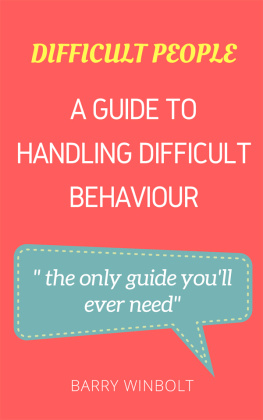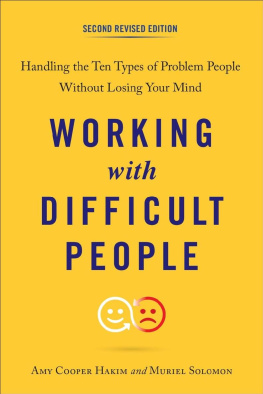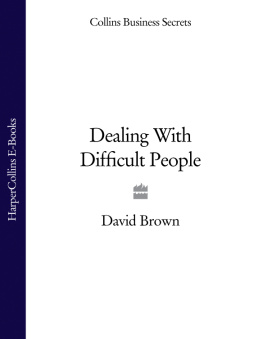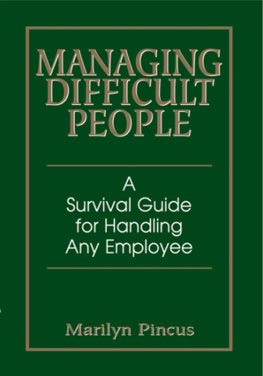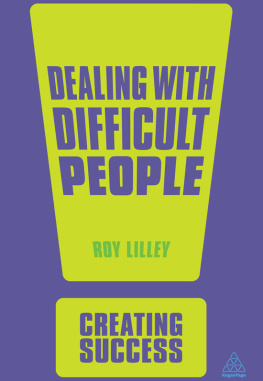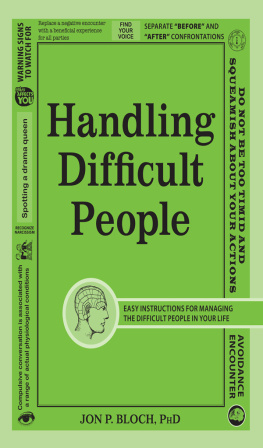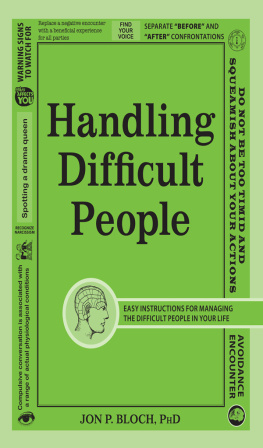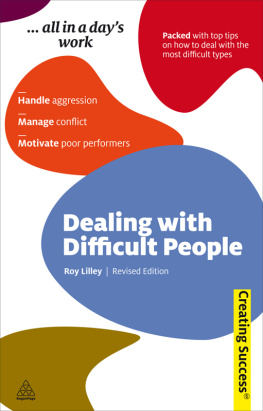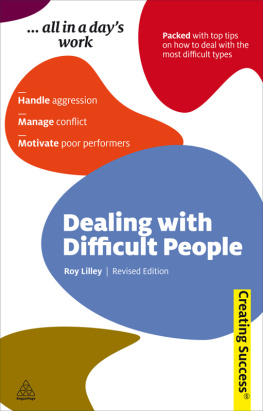Barry Winbolt - Difficult People; a Guide to Handling Difficult Behaviour
Here you can read online Barry Winbolt - Difficult People; a Guide to Handling Difficult Behaviour full text of the book (entire story) in english for free. Download pdf and epub, get meaning, cover and reviews about this ebook. year: 2022, publisher: ISR Publishing, genre: Politics. Description of the work, (preface) as well as reviews are available. Best literature library LitArk.com created for fans of good reading and offers a wide selection of genres:
Romance novel
Science fiction
Adventure
Detective
Science
History
Home and family
Prose
Art
Politics
Computer
Non-fiction
Religion
Business
Children
Humor
Choose a favorite category and find really read worthwhile books. Enjoy immersion in the world of imagination, feel the emotions of the characters or learn something new for yourself, make an fascinating discovery.
- Book:Difficult People; a Guide to Handling Difficult Behaviour
- Author:
- Publisher:ISR Publishing
- Genre:
- Year:2022
- Rating:4 / 5
- Favourites:Add to favourites
- Your mark:
- 80
- 1
- 2
- 3
- 4
- 5
Difficult People; a Guide to Handling Difficult Behaviour: summary, description and annotation
We offer to read an annotation, description, summary or preface (depends on what the author of the book "Difficult People; a Guide to Handling Difficult Behaviour" wrote himself). If you haven't found the necessary information about the book — write in the comments, we will try to find it.
Barry Winbolt: author's other books
Who wrote Difficult People; a Guide to Handling Difficult Behaviour? Find out the surname, the name of the author of the book and a list of all author's works by series.
Difficult People; a Guide to Handling Difficult Behaviour — read online for free the complete book (whole text) full work
Below is the text of the book, divided by pages. System saving the place of the last page read, allows you to conveniently read the book "Difficult People; a Guide to Handling Difficult Behaviour" online for free, without having to search again every time where you left off. Put a bookmark, and you can go to the page where you finished reading at any time.
Font size:
Interval:
Bookmark:
DIFFICULT PEOPLE
A Guide to Handling Difficult Behaviour
Barry Winbolt
ISR Publishing
Seaford

First published in 2002 by
ISR Publishing, Seaford, East Sussex, UK
Reprinted 2005
Revised and re-published 2017 (e-version)
Barry Winbolt
email:
All rights reserved. No part of this publication may be reproduced, stored in a retrieval system, or transmitted, in any form or by any means, without the prior permission in writing of Barry Winbolt.
The moral rights of the author have been asserted.
ISBN 978-0-9541686-3-6
Contents
Preface to the 2017 e-edition
A lot has changed since I first wrote this book 15 years ago, and a lot hasnt.
I originally wrote Difficult People with the workplace in mind. I drew on my work and experiences as a trainer and consultant. After publication, though, people started to tell me that the ideas, tips and strategies contained in the book were helping them to tackle difficult relationships in their private lives as well.
It was no surprise to me that this happened. Difficult behaviour is not limited to any single context or situation. It is a facet of all human interactions that conflict and disagreements can arise. The conduct of participants will decide how well, or badly, such differences are handled. Though many people initially read the book so that they could handle an issue arising at work with more confidence, they discovered a positive side-effect in improved relationships across the board.
As well as people from just about every kind of workplace you can imagine, I received glowing testimonials telling me how the ideas in the book had helped in non-work situations.
Parenting, family disputes, cantankerous relatives, teenagers, jealous partners, even acrimonious divorce all sorts of relationships, it seems, have benefitted from this book.
Why should this be? Learning how to handle someone elses difficult behaviour inevitably involves learning about ourselves. We cant control other people directly to change their behaviour, but we have unlimited control over our reactions and responses to that behaviour.
My original training as a family therapist has certainly influenced my writing and the tactics I suggest in the book, but a much richer part of my training has come from my own role as a parent of four (now adult) children, and my life experience through three happy marriages, and the occasional divorce..
Though I saw my main market for the book as the workplace, I was soon getting comments and emails that told me its real appeal was far broader. The examples used in the book are scenarios involving difficult behaviour at work, but readers were quick to spot that any kind of relationship, regardless of the context, can benefit from the advice in the book.
And thats where the real power lies. Difficult behaviour always happens in the context of a relationship. Once you have grasped the steps needed to deal with, say, someone who treats you badly at work, inevitably you will know how to tackle corresponding behaviour in any other sphere.
The ideas in this book can be applied wherever there are people; in work, family, or social spheres. The key is to identify the pattern of behaviour youd like to change, and to interrupt the pattern by managing how you respond. Simple as it sounds, this is not always easy to do, but this book will tell you how.
By the way, dont be fooled by the apparent simplicity of some of my strategies. Sometimes, a little nudge to the pattern of behaviour is all it takes to set powerful change in motion. If you are the one who has nudged it, then you are the one in control.
When I said a lot has changed, I wasnt meaning the basic aspects of human nature. Despite greater awareness of dignity at work, respect for diversity, and the importance of treating people as people rather than faceless resources to be managed unacceptable behaviour is just as common as it ever was.
Sadly, Ive noticed that, despite greater awareness and corresponding changes in the law, employees in many organisations seem to be feeling less empowered, not more. This seems to be fuelled by fears about job security. A comment I often hear is some version of I dont want to cause trouble, Im lucky to have a job!
One thing that may have fuelled this is that the business climate in both private and public sectors has been significantly affected by 10 years of austerity measures resulting from the financial crisis of 2007. Cutbacks are creating untold pressure, job security is a thing of the past, and the unremitting cycle of increased demand and organisational change produces a toxic cocktail that brings out the worst in some people.
This makes the ideas in Difficult People just as relevant as they ever were. When I wrote it, I thought that the book would have a relatively short shelf-life. Fifteen years on, Im finding that demand is more, not less. It is readers reactions to the book that have inspired me to re-read it myself, make a few changes, and publish it in this e-version.
One huge change since this book was first published has been the ease with which we can now get the information we need, when we need it. This e-book is an example of that, but theres more. In the days when books only existed in print, the distance between author and reader was great and only rarely was there any real contact between them.
Today, in a connected world, contact is not only possible, it is actively encouraged. Writers are generally happy to get feedback from their audience, and in many cases, this leads to stimulating exchanges. It also means that any limitations of an individual book can be by-passed; if you have a question, ask the author.
I am always happy to provide information or guidance relating to the content of what I write. As you see from my blog (www.barrywinbolt.com), part of my mission in life is offer ideas and tactics which will help you get a better handle on life.
Feel free to contact me if you need supplementary information or clarification on any aspect of this book. Ill be happy to provide what I can free of charge. Remember too that, if you want more detailed support or guidance, Im available as a Personal Consultant and Coach. You can reach me at .
I hope you enjoy this new edition of Difficult People; a Guide to Handling Difficult Behaviour. Above all, I hope you find it useful. Whether you are reading to enable you to tackle a specific situation, for the pleasure of self-improvement, or for career development, youll learn dozens of ways to upgrade your skills, communicate more effectively, and become more confident.
Thanks for reading
Barry Winbolt, Seaford, 2017
Introduction
Its no laughing matter
Other peoples difficult behaviour can affect us in many different ways. If we are fortunate, it will simply irritate us, but when it is extreme it can cause more serious problems. When I first started looking at how to cope with difficult people in my consultancy work and then for the first seminar series I was presenting some years ago, I naturally turned to any literature I could find on the subject. There was no shortage of books and articles. Some identified just one kind of behaviour, for example, manipulative types or nasty people. Others were wider ranging, and categorised difficult people under a number of headings, such as party-poopers, gossips or loud bores. One thing that struck me was that they almost always approached the subject light-heartedly, with cartoon illustrations, quips and anecdotes that illustrated the behaviour, and then recommended steps for dealing with it. They mostly treated their topic in a jocular way, as though other peoples difficult behaviour is something that has to be endured, and which, if we have the right tools, we can circumvent or change.
Next pageFont size:
Interval:
Bookmark:
Similar books «Difficult People; a Guide to Handling Difficult Behaviour»
Look at similar books to Difficult People; a Guide to Handling Difficult Behaviour. We have selected literature similar in name and meaning in the hope of providing readers with more options to find new, interesting, not yet read works.
Discussion, reviews of the book Difficult People; a Guide to Handling Difficult Behaviour and just readers' own opinions. Leave your comments, write what you think about the work, its meaning or the main characters. Specify what exactly you liked and what you didn't like, and why you think so.

